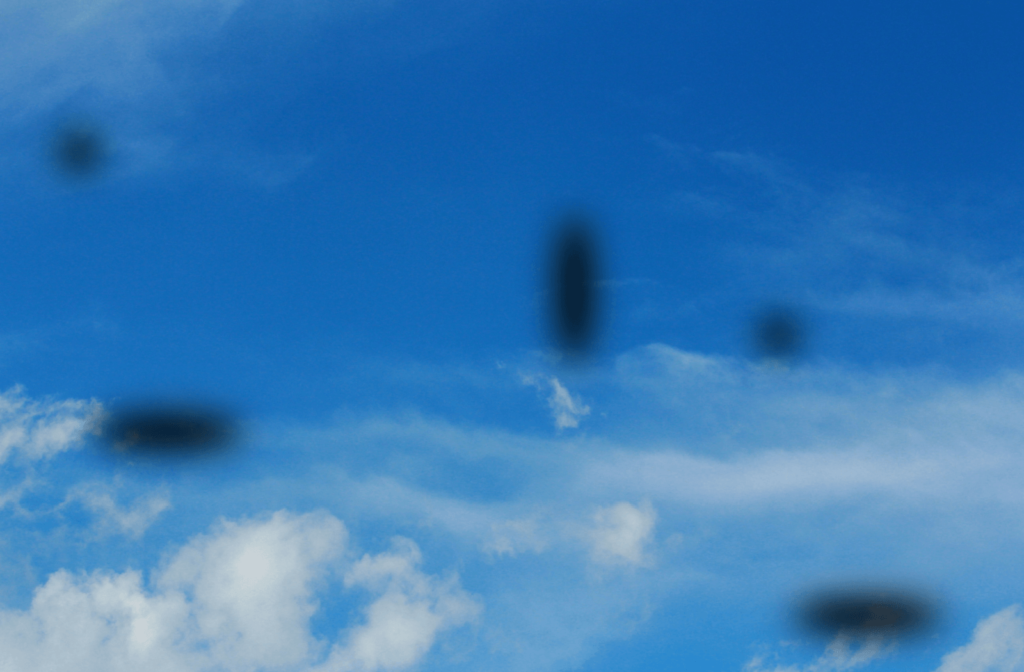Are you experiencing dry eye symptoms along with floaters? Are you wondering if one condition causes the other? If so, you’re not alone. Many people have experienced this combination of eye issues and may be concerned about their connection.
Dry eyes and floaters are two separate conditions that require different treatments. Although they may occur together in some cases, they are not directly related.
In this blog post, we’ll dive into what causes dry eye and floaters and how to treat both conditions.
What Causes Dry Eye Syndrome?
Our eyes are naturally lubricated by our tears, providing clear vision and protecting the eyes from irritation and infection.
However, when the eyes don’t receive enough lubrication, it can lead to dry eye syndrome. This condition affects many, causing discomfort, redness, and vision problems.
These are some of the most common causes of dry eye syndrome:
- Age-Related Changes: As we age, our eyes undergo certain changes that can disrupt the balance of tear production and drainage. For example, women going through menopause are more likely to experience dry eye because of hormonal changes. Similarly, older individuals may experience decreased tear production, leading to dryness and discomfort.
- Medications: Certain medications have been known to interfere with tear production, leading to dry eye symptoms. These medications include antihistamines, decongestants, and blood pressure drugs.
- Medical Conditions: Various medical conditions such as diabetes, rheumatoid arthritis, and lupus can cause dry eye syndrome. These conditions can affect the production and quality of tears, leading to persistent dryness and discomfort.
- Environmental Exposure: Environmental triggers such as smoke, wind, and prolonged screen time can also exacerbate dry eye symptoms.
Treatment for Dry Eyes
Fortunately, various remedies and treatments can help alleviate the discomfort associated with dry eyes. One popular solution is artificial tears, which can be bought over the counter in drugstores. These drops provide moisture to the dry or irritated areas on the surface of the eyes.
If artificial tears do not provide adequate relief, your doctor may recommend prescription medications like cyclosporine (Restasis) and lifitegrast (Xiidra). These medications work by increasing tear production and reducing inflammation in the eyes.
Additionally, if your eyes produce too many tears, your doctor may recommend punctal plugs. These small silicone plugs are inserted into the tear ducts to block the flow of tears, which can help keep the tears in your eyes longer and reduce dryness.
In some cases, excessive tears can be caused by loose lower eyelids, which can be corrected with lower eyelid surgery. This surgery is performed by an ophthalmologist and can improve the overall drainage of tears, reducing dryness.
Lifestyle remedies can also help alleviate dry eyes. These include limiting screen time, staying hydrated, wearing sunglasses outdoors, avoiding smoke, using a humidifier, and ensuring a diet rich in omega-3 fatty acids.
What Causes Eye Floaters?
As we age, the gel-like vitreous in our eyes starts to liquefy, which can cause it to pull away from the retina. As this process occurs, small clumps of collagen or other protein fibers in the vitreous can become visible and cast a shadow on the retina. These shadows appear as floaters and can take on various shapes, including dots, lines, cobwebs, or even larger cloud-like shapes.
While aging is the most common cause of floaters, certain medical conditions or previous eye surgeries can also contribute to their formation. For instance, individuals with nearsightedness or diabetes may be more prone to develop floaters. Similarly, those who have had cataract surgery in the past have a higher risk of developing floaters due to changes in the vitreous caused by the procedure.
Another potential cause of floaters is retinal detachment. It occurs when the retina becomes detached from the back of the eye and can cause a sudden increase in floaters and other symptoms, such as flashes of light and a decrease in vision.
Treatment for Floaters
In most cases, eye floaters do not require treatment and will gradually become less noticeable as the brain adapts to their presence. However, surgical intervention may be necessary in rare cases with severe floaters or impaired vision. Vitrectomy is a surgical procedure where the vitreous is removed and replaced with a saline solution or gas bubble to help improve vision.
Possible Links Between Dry Eyes and Eye Floaters
While dry eyes and eye floaters are more common as we age, no evidence suggests they are connected. Diabetes increases the risk of floaters, while autoimmune diseases like lupus increase the risk of dry eye. Despite these links, the causes of each condition are distinct and not related to each other.
Seek Professional Vision Care at Pinnacle Eyecare Today
It is clear that there are many differences between dry eyes and floaters. If you feel like you have either of these conditions or have any vision issues in general, then it is important to turn to an expert for help.
At Pinnacle Eyecare, we can provide comprehensive and specialized care through eye exam services and treatments. Our team is friendly and eager to answer any questions you may have about your vision. Contact us today if you’re looking for knowledgeable and professional vision care!






